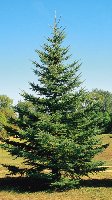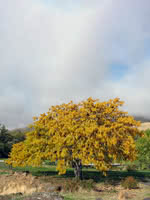Mon-Fri 9am - 5pm Mountain time
Black Hills Spruce vs Thornless Honeylocust
Picea glauca var. densata
Gleditsia triacanthos inermis
Black Hills Spruce is a subspecies of White Spruce native to the Black Hills of South Dakota. It has a strongly conical form, slower growth rate and denser foliage than typical white spruce, making it preferable as a specimen tree for smaller suburban lawns. It also responds well to pruning, and can be used as a hedge or even bonsai.
Thornless Honey Locust makes an excellent shade tree with its lacy foliage and dappled shade. The leaves are honey-yellow, light and airy, providing interesting color and texture to your landscape. This variety is thornless, and the seeds and pods provide food for wildlife such as deer and squirrels.
The Thornless Honey Locust is tolerant of drought, various soil conditions, and even road salt.
Black Hills Spruce Quick Facts
Thornless Honeylocust Quick Facts
In row spacing: 3 - 4 m (10 - 12 ft)

